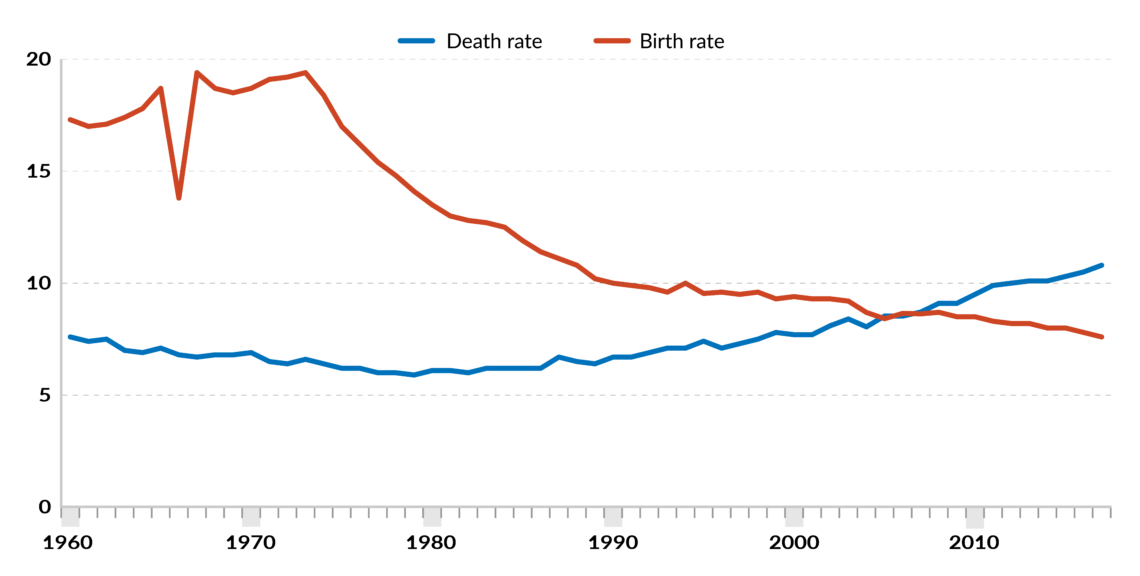Japan’s unique social contract
While Japan has known prosperity and stability under the leadership of Prime Minister Shinzo Abe, it faces demographic challenges. Many Japanese see immigration as a threat. But the rapidly declining population will need to be boosted to avoid economic collapse.

In a nutshell
- Social cohesion undergirds Japanese politics and economy
- However, several threats to this cohesion are on the horizon
- Leaders will need to navigate necessity and voters’ expectations
This new series of GIS reports examines how effectively countries are ruled and the consequences of governing systems for economies, societies and nations’ development prospects.
We are currently witnessing the end of the Pax Americana in Asia. While China rises as a new regional hegemon, there is increasing uncertainty over whether the United States will shield its Asian allies in case of a major crisis or even of war. These concerns are particularly salient in East Asia, where the unpredictable North Korean regime and its open nuclear ambitions cast a dark shadow.
In years to come, Japan will have to face several major challenges. In addition to growing geopolitical precariousness, the Japanese economy – which is fully dependent on fossil fuel imports, and which relies on considerable food imports – is vulnerable to external threats. Furthermore, the country faces an acute demographic distortion with a rapidly aging and shrinking population. This trend will only get worse as decades pass.
Mutual benefits
The Japanese people, since time immemorial, have had to live in an extremely dangerous environment. In fact, it is safe to say that the Japanese archipelago is one of the most inhospitable places on earth. In addition to lacking natural resources and arable land, Japan has to regularly face the fury of nature, be it in the shape of frequent typhoons or major earthquakes. It could be argued that this extremely dangerous environment binds the Japanese people together.
Japan’s social contract provides benefits to both the state and its citizens.
Japan’s social contract provides benefits to both the state and its citizens. By submitting oneself to the rigorous discipline of society, one gains high security as a reward. Nobody falls through the net. Japanese citizens accept their social status, and they fulfill the obligations it entails. Of course, this implies a high degree of cultural, ethnic and socioeconomic cohesion. The Japanese see themselves as a middle-class society, and tend to be against substantial immigration, which would threaten this cohesion.
On the political front, the institution that embodies this stability is the Liberal Democratic Party (LDP). The LDP resulted from the merger of two conservative parties, the Liberal Party and the Democratic Party, in 1955. Since then, the LDP has governed Japan for all but three years.
Facts & figures
Governance in Japan
Japan is a parliamentary constitutional monarchy. The emperor is the head of state, although the government is controlled by the cabinet.
The Emperor:
- Emperor Naruhito acceded to the throne in May 2019, after his father, Emperor Akihito, abdicated
- He is the 126th monarch of Japan
- His duties mostly consist of ceremonial functions
The Cabinet:
- Japan’s executive branch consists of the prime minister, who is designated by the National Diet, and 19 Ministers of State, who are appointed by the prime minister
- The current cabinet is led by Prime Minister Shinzo Abe
The National Diet (Kokkai):
- The Kokkai is Japan’s bicameral legislature
- Its lower house, the House of Representatives (242 seats), and its upper house, the House of Councillors (456 seats), are both directly elected
The Supreme Court (Saiko-Saibansho):
- Japan’s Saiko-Saibansho consists of a chief justice and 14 associate justices designated by the Cabinet
- It oversees Japan’s judicial system, and has jurisdiction in constitutional issues
Source: CIA
Economic cost and benefit
The Japanese social contract has very concrete economic implications, which too few analyses of Japanese economic performance take into consideration. One crucial issue is the Japanese government’s high public debt. Many would assume such a debt to be a calamitous burden on the Japanese economy.
Looking more closely at the figures, however, one has to take note of the peculiarity that the overwhelming majority of government debt, some 97 percent, is held by the Japanese.
This debt functions like a deposit in the golf club. All Japanese belong to “Golf Club Japan.” If the club requires additional funds, for example for building a new clubhouse, it contacts the members and urges them to make a special contribution. The government could easily reduce the debt by asking the public to buy it back. Such an appeal would not go unheeded by the overwhelming majority of the Japanese.
Facts & figures

Of course, the mercantilist spirit that shapes Japan’s social contract has its price. Japanese markets are very difficult for foreign competitors to reach. This results in Japanese consumers and Japanese businesses paying higher prices than necessary.
A Japanese consumer activist once said, when asked about the defense of consumer interest: “Here in Japan we all have a producer mentality.” As a result, the Japanese are very reluctant to criticize price levels, although there would be good reason for criticism as many prices are hiked by an inefficient system of intermediary trade.
The mentality that is behind the social contract has a significant impact on industrial relations, too. Trade unions put a special emphasis on their contribution to make companies competitive and successful, while management and major shareholders emphasize the importance of all stakeholders. This is at the core of the unique nature of Japanese companies. Japan Inc. is so successful because all its social partners have a common goal.
Service culture
Foreigners are often impressed by the extraordinarily high levels of service culture. Japanese culture is based on an all-pervasive respect for services. Japan does not know the caste mentality that is prevalent not only in India but that has also afflicted much of Europe, particularly in the Anglo-Saxon world – where those with an academic education rank higher than those with vocational training.
It is significant that with its industrial modernization in the late 19th century Japan adopted the German Meisterlehre (master teacher). Even today, in Japanese the term “Meister” is used to describe a person with particular skills. There is great pride in being a baker, an electrician or an artisan. In fact, one of the highest honors bestowed on artisans with extraordinary skills is the title “living national treasure.”
There are no outcasts and no jobs that are predominantly performed by low-skilled foreign labor.
There are no outcasts; no jobs that are predominantly performed by low-skilled foreign labor. Service culture can only exist in an environment where services are provided in a competent and diligent manner, but also received with the appreciation they deserve. Once again, this is a mutual transaction based on the prevailing social contract.
Demographic challenges
Prime Minister Shinzo Abe is a man of great ambition with a sense of mission. Once he quits, he will be remembered for a few big initiatives. Under his leadership, Japan has most certainly grown its international profile. With his ambitious “Abenomics” policy the prime minister has set valuable targets for the modernization of the Japanese economy.
However, Japan is facing some challenges that require profound structural change. Obviously, the lack of substantial reforms will also be part of Prime Minister Abe’s legacy. The most pressing challenge is Japan’s distorted demographic pyramid. The Japanese population is aging and shrinking at a rapid rate, with no remedy to break this dangerous trend in sight.
One of the main benefits of the Japanese social contract is an extraordinary degree of security. It is this safety that makes it so difficult to undertake substantial, fundamental reforms. Social cohesion is at the very heart of Japan. Once this unity is lost, cracks will appear.
Japan as it evolved during the last 150 years is facing an existential challenge.
Demographic distortions caused by increasing life expectancy and shrinking births are noticeable in many industrial societies. However, in most cases immigration mitigates the consequences since newcomers tend to be younger and have more children. As Japan does not have substantial immigration, these corrections do not apply.
Scenarios
Today Japan is already facing labor shortages in several fields, most notably in the construction industry and in health services. This situation will worsen in the years to come unless some drastic measures are taken. The key question is whether the government will turn toward reforms that could endanger the existing social contract. The goal will be to reconcile short-term needs with their long-term impact.
Japanese society as it evolved during the last 150 years is facing an existential challenge. Whatever reforms are undertaken, whether demographic, economic or geopolitical, the government and the Japanese public as a whole will be highly unwilling to weaken the social contract. Too much would be at stake; an essential element of Japan’s identity as a country, a society and a culture would be endangered. Japan will need to innovate to create a path that will allow it to maintain its uniqueness while implementing the reforms that are needed.








